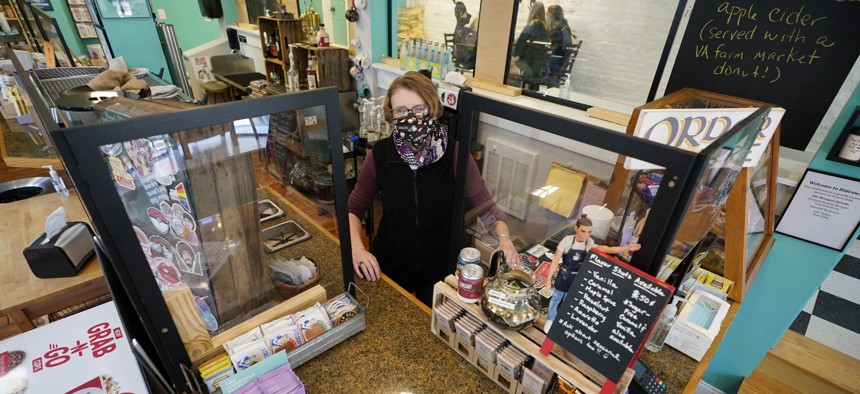Local and State Governments Spent $9 Billion on Small Business Aid

Victoria Leigh Kidd, owner of Hideaway Café, greets customers from behind protective shields in her shop in the Old Town area of Winchester, Va., Wednesday, Oct. 7, 2020. AP Photo/Steve Helber
As the economy cratered during the pandemic, local and state governments offered an important financial lifeline for small businesses, according to a new report.
Small business relief programs run by state and local governments have provided more than $9.2 billion in grants and loans to help businesses stave off layoffs or closures as the economy tanked during the coronavirus pandemic, according to a new analysis of local aid programs.
In the early days of the pandemic, these locally run programs were often the first to get money to hemorrhaging businesses and workers. Even after federal aid became available, local and state assistance filled in the gaps of those larger programs, said a report from the Institute for Local Self-Reliance. More than 800 cities, counties and states launched their own relief programs targeted for local businesses.
The type of aid offered through the programs has changed over the course of the pandemic. Many of the earliest programs provided interest-free loans that were meant to help sustain businesses until federal aid was available—money that could be used to pay rent or mortgages.
By late spring, local relief programs began to offer funding that businesses could use to help reopen or operate safely, such as grants to reconfigure office space or buy personal protective equipment, the report found.
Small businesses have been hit hard by coronavirus-related closures, and the report said “local programs are a critical part of the solution because they are able to respond effectively and creatively to local needs and circumstances.”
The Census Bureau’s most recent small business survey found that 44% of businesses experienced a moderate negative effect from the coronavirus pandemic, while 30% of business owners said they experienced a large negative effect. In New York City, small businesses shed more than 520,000 jobs as of August, and one-third of the city’s businesses were at risk of closing due to the ongoing pandemic.
The federal Paycheck Protection Program, which provides forgivable loans to businesses, has distributed 5 million loans totaling $525 billion. But critics have said the program operated on a first-come, first-served basis that did not prioritize businesses based on need, which often meant smaller companies didn’t get the help they needed. A report released this month by Democratic staff on the House of Representatives’ Select Subcommittee on the Coronavirus Crisis said that “small businesses that were truly in need of financial support during the economic crisis often faced longer waits and more obstacles to receiving PPP funding than larger, wealthier companies.”
The need has been plainly visible at the local level, where locally run programs often max out the same day they open for applications.
In Hillsboro, Oregon, the city ended up doubling its Small Business Emergency Relief Program to provide $1 million in grants after the original $500,000 fund was depleted within hours, the report found. Bexar County, Texas offered $5.25 million in grants and loans, but within the first week of the program the county had received 650 applications totaling $42 million in requests. When the county later received federal CARES Act funding, it reupped the program and provided an additional $1.5 million in small business grants.
These types of local programs “have kept hundreds of thousands of small businesses afloat so far and helped them adapt to the surreal commercial environment the pandemic has created,” the ILSR report states. “But absent additional and ongoing funding these crucial programs will cease, leaving hundreds of thousands of small businesses at risk of going under in the coming months.”
In Washington, D.C., Republicans and Democrats have struggled to come to agreement over a coronavirus stimulus package. The Republican-led Senate on Tuesday was considering piecemeal legislation to fund a new round of PPP payments, but Democrats have been critical of the move, calling it a political stunt and arguing that broader relief is needed.
It remains unclear whether lawmakers will be able to pass any broader relief package before the election. But the ILSR report concludes that local programs alone “are not a substitute for the kind of direct federal assistance that small businesses need and that many other nations are providing.”
Andrea Noble is a staff correspondent with Route Fifty.
NEXT STORY: New Hampshire to Sue Massachusetts Over Income Tax Policy





